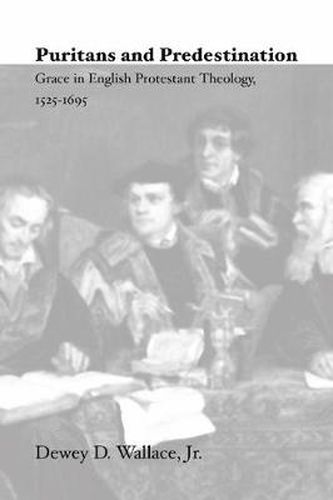Readings Newsletter
Become a Readings Member to make your shopping experience even easier.
Sign in or sign up for free!
You’re not far away from qualifying for FREE standard shipping within Australia
You’ve qualified for FREE standard shipping within Australia
The cart is loading…






This title is printed to order. This book may have been self-published. If so, we cannot guarantee the quality of the content. In the main most books will have gone through the editing process however some may not. We therefore suggest that you be aware of this before ordering this book. If in doubt check either the author or publisher’s details as we are unable to accept any returns unless they are faulty. Please contact us if you have any questions.
A major contribution to Puritan scholarship, ‘Puritans and Predestination’ presents the first consistent and thorough historical analysis of a key Puritan theological concept - predestination. For almost two centuries prior to 1695, English religious and cultural life endured a period of great upheaval. Dewey Wallace illuminates this complex era by tracing patterns of religious thought that took root in early English Protestantism and by explaining their social, cultural, and ecclesiastical implications. ‘Puritans and Predestination’ concludes that the differences between Puritan and Anglican theology were often subtle and sometimes nonexistent. Central to Protestant theology was the doctrine of grace - the notion that salvation was a divine gift, a free gift to those who believed. Among the many elements that constituted the doctrine of grace, predestination was the foremost. Wallace believes that shifting attitudes toward and emphases on predestination serve as both a measure of the extent of theological unity and an index of theological change. Among the significant conclusions documented in the course of this study are the importance of the Bucerian order of salvation in the early English Reformation, the anachronistic character of reading sharp differences in outlook between Puritan and Anglican, and the centrality of the piety and theology of grace in Puritanism. Wallace also explores the radically innovative character of the Laudian and Arminian theology, the inroads of rationalistic moralism into theology by the middle of the seventeenth century, and the emergence among later Stuart Dissenters of an evangelical pietism prefiguring the religion of the awakenings. This book will be indispensable to those interested in Puritanism and the theology of the Church of England.
$9.00 standard shipping within Australia
FREE standard shipping within Australia for orders over $100.00
Express & International shipping calculated at checkout
This title is printed to order. This book may have been self-published. If so, we cannot guarantee the quality of the content. In the main most books will have gone through the editing process however some may not. We therefore suggest that you be aware of this before ordering this book. If in doubt check either the author or publisher’s details as we are unable to accept any returns unless they are faulty. Please contact us if you have any questions.
A major contribution to Puritan scholarship, ‘Puritans and Predestination’ presents the first consistent and thorough historical analysis of a key Puritan theological concept - predestination. For almost two centuries prior to 1695, English religious and cultural life endured a period of great upheaval. Dewey Wallace illuminates this complex era by tracing patterns of religious thought that took root in early English Protestantism and by explaining their social, cultural, and ecclesiastical implications. ‘Puritans and Predestination’ concludes that the differences between Puritan and Anglican theology were often subtle and sometimes nonexistent. Central to Protestant theology was the doctrine of grace - the notion that salvation was a divine gift, a free gift to those who believed. Among the many elements that constituted the doctrine of grace, predestination was the foremost. Wallace believes that shifting attitudes toward and emphases on predestination serve as both a measure of the extent of theological unity and an index of theological change. Among the significant conclusions documented in the course of this study are the importance of the Bucerian order of salvation in the early English Reformation, the anachronistic character of reading sharp differences in outlook between Puritan and Anglican, and the centrality of the piety and theology of grace in Puritanism. Wallace also explores the radically innovative character of the Laudian and Arminian theology, the inroads of rationalistic moralism into theology by the middle of the seventeenth century, and the emergence among later Stuart Dissenters of an evangelical pietism prefiguring the religion of the awakenings. This book will be indispensable to those interested in Puritanism and the theology of the Church of England.